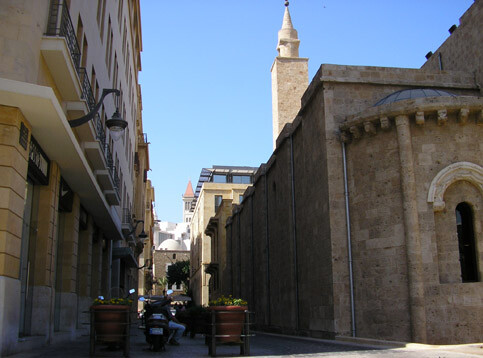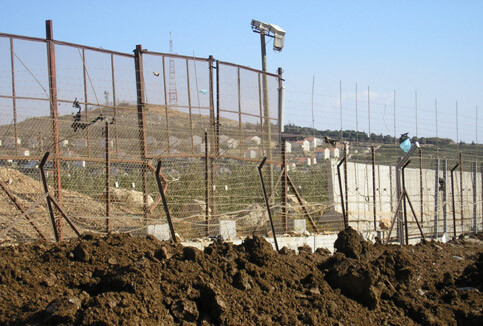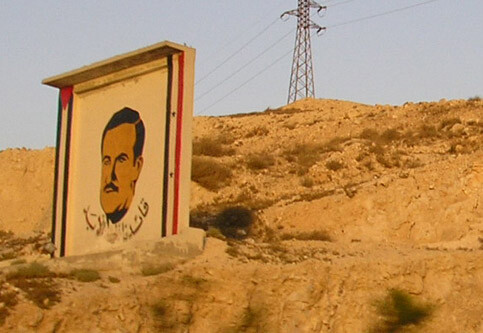The Electronic Intifada 13 March 2005

Rafiq Hariri’s Horizon 2000 project, a rebuilding of Beiruts city centre intended to be a symbol of Lebanons reconstruction. (Arjan El Fassed)
Once again, it seems that US President George W. Bush has declared victory and “mission accomplished” far too early: The heralded “Lebanese Spring,” which Washington’s PR experts quickly dubbed the “Cedar Revolution,” has not been a slam-dunk validation of US Middle East policies after all. Just ten days after stepping down from the position of prime minister in President Emile Lahoud’s government, Omar Karameh is about to step back into place again.
Meanwhile, hundreds of Syrians took to the streets of Damascus declaring their loyalty to President Bashar al-Assad even as Syrian troops prepared to leave Lebanon. Most significant of all, Hizbullah’s immense demonstration last week was a powerful reminder that Lebanon’s fractious, shape-shifting Opposition has a formidable rival in the highly fluid field of Lebanese politics. Anyone who feels shocked, disappointed, or glum about these events should recall a wise saying of Lebanon’s own Khalil Gibran: “Your pain is nothing but the breaking of the shell that encloses your understanding.”
Despite conspiracy theories and grim assessments to the contrary, something new, amazing, and precious is indeed being born in Lebanon: an indigenous, responsive, truly plural form of democracy that is not Made in the USA, but forged out of a long and difficult Arab experience. Apparently, many thought this would be a Caesarian delivery under strong anaesthia. Wrong: it will be a painful, protracted, and loud labor and birth. Although considerable debate is now heard inside and outside Lebanon about this baby’s parentage, ideological DNA tests do not indicate that George W. Bush is the father.
Since the Lebanese are about to become parents, the very least they can do is grow up and assume responsibility for what they are bringing into the world. They must also be congratulated for handling the first stages of labor so admirably: in one month since the criminal assassination of former Prime Minister Rafiq Hariri and nearly twenty others, all protests have been non-violent.
Lebanese from all backgrounds have voiced their views and aims in public, and all have expressed hopes for a new order based on democratic and fair principles. The demonstrations in Martyrs Square, as well as last Tuesday’s demonstration, have all been examples of people power and expressions of grass roots sentiments. They may not be in harmony, but they are all Lebanese.
Debate and dissent are the heart and soul of democratic politicking, and freedom of expression and assembly are keystones of any democratic society. Yet the foundation of a democratic order is the rule of law and a judicial system capable of providing equal access to justice while denying impunity to the powerful. Without equality and justice, freedom is meaningless, even dangerous.
The Lebanese are actually less in need of personal liberties than they are in need of public accountability and a renewed and reformed state structure. The worst damage Syria has done to Lebanon has been in terms of institutional and administrative corruption. Lebanon’s judiciary requires special attention. As long as 17,000 disappeared people are still missing and their families denied emotional and legal closure, there will never be trust in Lebanon, and without trust, a democratic order will not survive long.
The Syrians have been “babysitters” of the Lebanese since the war ended in 1990, and given that the war did not break out again, they deserve credit. Up until recently, the Lebanese have needed them because they have not wanted to deal with the baggage of the war years.

Fatima Gate on the Lebanon-Israeli border near the southern Lebanese village of Kfar Kila. The gate was one of many crossing points that the Israeli army constructed to sustain the occupation of southern Lebanon. (Arjan El Fassed)
Prevailing neoconservative notions of freedom and democracy in the Arab world do not traffic much in notions of justice or accountability. Rather, they are more akin to notions that, in Arabic, are described as fitnah, the complete breakdown of social and political order. George W. Bush, a single-minded cowboy who purveys double-standards in the Middle East, has already finagled the US government, the international community, and the UN into scorching one Arab country, Iraq, with his “untamed fires of freedom.” Neither Lebanon nor Syria wishes to be the next to be singed.
Double standards, doubled troubles
Having survived the conflagration of Lebanon’s 1975-1990 war, a multi-dimensional conflict that took more than 150,000 lives and saw the US, Israel, Iran, and Syria embroiled in the bloodletting, few Lebanese embrace or trust American designs and intentions when it comes to “democratization.” Claims that Lebanon cannot have elections while under Syrian occupation sound surreal, even hilarious, when juxtaposed with the fact that the Bush administration pressed for elections to proceed in Iraq and Palestine under conditions of military occupation. Simply casting ballots in these two occupied venues then qualified them as democracies in Washington’s eyes. But democracies require sovereignty.
Washington has also sidelined UN Security Council resolutions of four decades’ standing, particularly resolutions 242 and 338 concerning a just settlement of the Israeli-Palestinian conflict, while venerating resolution 1559 as Holy Scripture. President Bush’s sudden interest in Lebanese human rights issues raises suspicions throughout the region, as his administration’s human rights sermons are often followed by aerial bombardments.
More to the point, no one will believe Washington’s lofty rhetoric about ballots and freedom while the US continues to excuse or ignore Israel’s ongoing, massive and systematic human rights abuses in the West Bank and Gaza, which Human Rights Watch found to have worsened considerably over the last year.
Were the US truly concerned about attaining democracy and human rights in the Middle East, there is no better place to start than in the occupied West Bank and Gaza Strip, where US funds, diplomatic support, and weaponry ensure that everyday life is a living hell for millions of innocent people.

A portrait of the late Syrian president Hafez Al-Assad at the road between Masna and the border crossing between Lebanon and Syria. (Arjan El Fassed)
As long as clear double standards obtain in the Middle East, the new political developments in Lebanon will be viewed with doubt throughout the Arab and Islamic world, where suspicions are growing by the day that the Lebanese are motivated not by indigenous experiences, emotions and autonomous choices, but rather, by a US imperialist plot to remove regimes that Washington does not like while protecting others, just as abusive, that are allied with America.
But those who angrily mount a knee-jerk defense of Damascus simply because the US is against Syria, or out of an understandable outrage at US hypocrisy, are playing a dangerous game and putting cynicism above hope. They should listen carefully to all the contending voices in Lebanon. No one in Lebanon wishes to see the destruction of Syria; even those who have publicly praised Syria also say clearly that it is time for Syrian troops to leave.
Some Western media have given the false impression that those calling for Syrian intervention to cease are all of one confessional or ideological membership, and that the Martyrs Square demonstrations are tantamount to full support of US policies. Since the so-called “Opposition” in Lebanon is neither cohesive nor organized, it is hard to discern who truly speaks for it, or what, indeed, it truly wants.
The thousands of people demonstrating in Martyrs Square do not, thus far, articulate with a clear and consistent leadership. So, while everyone in Lebanon has been speaking out freely and fearlessly over the last month, the biggest difference within Lebanon now is between those who are well-organized, like Hizbullah, and those who are not.
The many in the one
Lebanon may be, as historian Kamal Salibi wrote, a “house of many mansions,” but it is trying to be one state, soveriegn and free again. Lebanon knows what it is: a multiethnic and multisectarian polity facing the challenges of true power-sharing and just governance. Israel has not yet woken up to the undeniable fact that it is facing these things, too. Though no one in Washington wants to admit it, were the same political and moral criteria now applied to Iraq, Syria, and Lebanon to be applied to Israel, all would clearly see that the Jewish state is in dire need of human rights oversight and democratization. Israel’s political system is founded upon institutionalized discrimination; in the West Bank and Gaza, Israeli rule is functionally indistinguishable from Apartheid.
Lebanon’s coming changes will not take place in a calm and stable context or in a controlled vacuum. Indeed, Lebanon’s political revitalization may have a significant impact on Israel’s hegemonic political discourses, and raise very troubling and long-overdue questions about Zionism as a system of governance and a machine of occupation and grave human rights violations.
Maybe this is what scares many, Arabs and Israelis alike, upon realizing that Lebanon is stirring from its long and fitful post-war slumber. Just as “people power” in Lebanon would shake the foundations of repressive states like Egypt and Saudi Arabia, indigenous democratization efforts in Lebanon may well make the two-state solution in Israel, as well as the current exclusivist and abusive one state solution, look out of place, hypocritical, or simply wrong.
New possibilities for politicking?
When I lived and taught in Lebanon in the mid-1990s, I was astounded by the breadth of programming on television: everything from call-in talk shows about domestic violence to the rights of Gays and Lesbians, to video footage of Hizbullah’s latest attacks on occupying Israeli forces in the south overlaid with Quranic recitations. I remarked in class one day that there was probably more diversity of opinion expressed on Lebanese television than in the US. A student said, “Yes, in Lebanon, everything is permitted, but nothing is possible.”
Maybe this cynical assessment will have to be reviewed in light of the last month’s events. Freely discussing various ideas and beliefs is one thing. Politicking fearlessly for them in public is quite another. But fear is gone now in Lebanon, and the Lebanese are now actively politicking and thereby expanding the definition of the possible — for themselves and perhaps for their neighbors as well.
Thus far, considering that virtually all demonstrations have been conducted in a civil fashion, it is clear that the Lebanese are showing real political maturity in a very emotional and nebulous situation. As they prepare to mark one month since the assassination of former Prime Minister Rafiq Hariri, they could best honor his memory by pledging never again to destroy Beirut through internally generated or externally manipulated conflicts.
EI co-founder Laurie King-Irani, a social anthropologist and former editor of Middle East Report, lived and worked in Beirut from 1993-1998.





